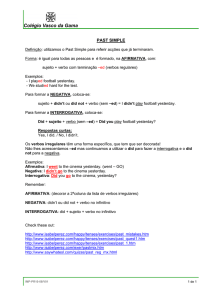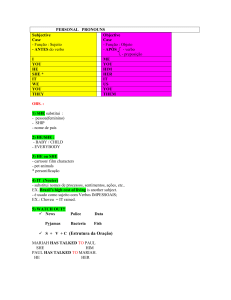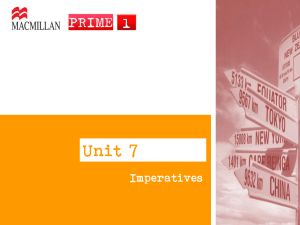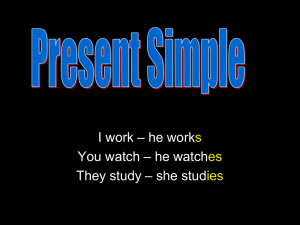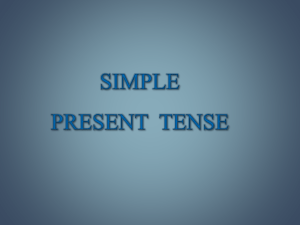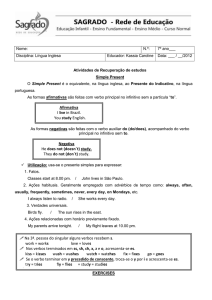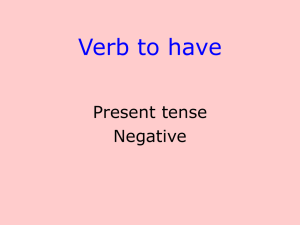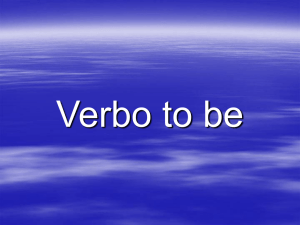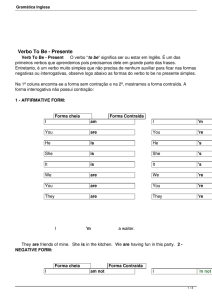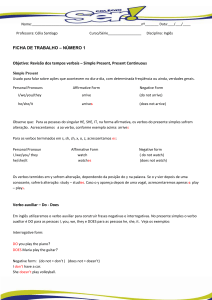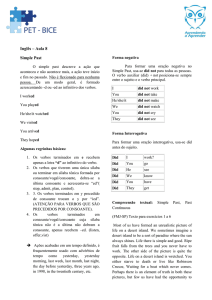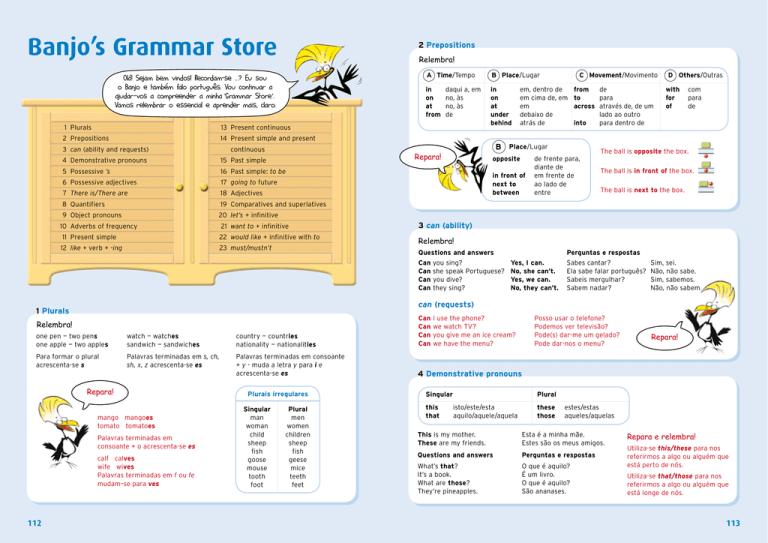
Banjo’s Grammar Store
2 Prepositions
Relembra!
A Time/Tempo
Ola!´ Sejam bem vindos! Recordam-se ...? Eu sou
´ falo portugues.
^ Vou continuar a
o Banjo e tambem
ajudar-vos a compreender a minha ‘Grammar Store ’.
Vamos relembrar o essencial e aprender mais, claro.
1 Plurals
13 Present continuous
2 Prepositions
14 Present simple and present
3 can (ability and requests)
continuous
in daqui a, em
on
no, às
at
no, às
from de
B Place/Lugar
in
on
at
under
behind
em, dentro de from
em cima de, em to
em
across
debaixo de
atrás de
into
B Place/Lugar
Repara!
opposite
in front of
next to
between
4 Demonstrative pronouns
15 Past simple
5 Possessive ’s
16 Past simple: to be
6 Possessive adjectives
17 going to future
7 There is/There are
18 Adjectives
8 Quantifiers
19 Comparatives and superlatives
9 Object pronouns
20 let’s + infinitive
10 Adverbs of frequency
21 want to + infinitive
3 can (ability)
11 Present simple
22 would like + infinitive with to
12 like + verb + -ing
23 must/mustn’t
Relembra!
you sing? she speak Portuguese?
you dive?
they sing?
de
para
através de, de um
lado ao outro
para dentro de
D Others/Outras
with com
for
para
of
de
The ball is opposite the box.
The ball is in front of the box.
The ball is next to the box.
Perguntas e respostas
Yes, I can.
No, she can’t.
Yes, we can.
No, they can’t.
Sabes cantar?
Ela sabe falar português?
Sabeis mergulhar? Sabem nadar?
Sim, sei.
Não, não sabe.
Sim, sabemos.
Não, não sabem.
can (requests)
1 Plurals
I use the phone?
we watch TV?
you give me an ice cream?
we have the menu?
Posso usar o telefone?
Podemos ver televisão?
Pode(s) dar-me um gelado?
Pode dar-nos o menu?
one pen — two pens
one apple — two apples
watch — watches
sandwich — sandwiches
country — countries
nationality — nationalities
Can
Can
Can
Can
Para formar o plural
acrescenta-se s
Palavras terminadas em s, ch,
sh, x, z acrescenta-se es
Palavras terminadas em consoante
+ y - muda a letra y para i e
acrescenta-se es
4 Demonstrative pronouns
Relembra!
Repara!
mango mangoes
tomato tomatoes
Palavras terminadas em
consoante + o acrescenta-se es
calf calves
wife wives
Palavras terminadas em f ou fe
mudam–se para ves
112
de frente para,
diante de
em frente de
ao lado de
entre
Questions and answers
Can
Can
Can
Can
C Movement/Movimento
Plurais irregulares
Singular
man
woman
child
sheep
fish
goose
mouse
tooth
foot
Plural
men
women
children
sheep
fish
geese
mice
teeth
feet
Singular
this
that
Repara!
Plural
isto/este/esta
aquilo/aquele/aquela
these
those
estes/estas
aqueles/aquelas
This is my mother.
These are my friends.
Esta é a minha mãe.
Estes são os meus amigos.
Questions and answers
Perguntas e respostas
What’s that?
It’s a book.
What are those?
They’re pineapples.
O que é aquilo?
É um livro.
O que é aquilo?
São ananases.
Repara e relembra!
Utiliza-se this/these para nos
referirmos a algo ou alguém que
está perto de nós.
Utiliza-se that/those para nos
referirmos a algo ou alguém que
está longe de nós.
113
8 Quantifiers
5 Possessive ’s
Relembra!
Ao contrário do português, em inglês, o indicador de posse ’s é colocado depois do possuidor e
seguido do objeto.
Possuidor + ’s
The boy’s ball.
Tina’s watch.
There are some books.
There aren’t any
posters.
Have you got any
cows?
A bola do rapaz.
O relógio da Tina.
some/any referem-se a
quantidades indefinidas.
The boys’ ball. A bola dos rapazes.
Quando o nome do possuidor termina com -s, pode-se optar por só acrescentar
o apóstrofo ’ ou por acrescentar o apóstrofo ’ e -s.
James’ watch.
James’s watch.
Há alguns livros.
Não há nenhuns
posters.
Tens algumas vacas?
Uso
some em frases afirmativas
any em frases negativas e
interrogativas
O relógio do James.
O relógio do James.
Ao contrário do português, quando se enumeram vários possuidores,
o indicador de posse ’s só é colocado no último possuidor.
Mary, Helen and Peter’s house. A casa da Mary, da Helen e do Peter.
9 Object pronouns
6 Possessive adjectives
Possessive pronouns
Repara!
Possessive adjectives Possessive pronouns
It’s my dog.
It’s your pencil.
They’re his books.
It’s her dress.
It’s its tail.
It’s our house.
They’re your friends.
It’s their car.
The
The
The
The
The
The
The
The
dog is mine.
pencil is yours.
books are his.
dress is hers.
tail is its.
house is ours.
friends are yours.
car is theirs.
Em inglês há diferença entre
determinantes e pronomes
possessivos.
It’s my dog.
É o meu cão.
The dog is mine./It’s mine. O cão é meu./É meu.
• No caso do pronome, o objeto foi
mencionado antes.
Singular
Plural
There is … .
There isn’t … .
Is there … ?
There are … .
There aren’t … .
Are there … ?
Há/Existe/Existem … .
Não há/Não existe/Não existem … .
Há… ?/Existe ... ?/Existem ... ?
Repara!
O verbo só se conjuga na 3.ª pessoa, no singular e plural.
There is a sofa.
There are two bedrooms.
114
Subject
Personal pronouns
I
You
He
She
It
We
You
They
me
you
him
her
it
us
you
them
• O determinante é sempre seguido do objeto.
7 There is/There are
Positive
Negative
Interrogative
Respondem à pergunta How often ...?
never sometimes usually often always
0%
Há um sofá.
Há dois quartos.
Repara na barra. Estes
advérbios indicam a
frequência com que se pratica
uma ação.
I never read in bed.
I’m usually happy.
Eu habitualmente estou
feliz.
He often plays
tennis.
Ele joga ténis
frequentemente.
They are always late. Eles estão sempre
atrasados.
Posição dos advérbios
antes do verbo principal – advérbio + verbo
mas
depois do verbo to be – to be + advérbio
11 Present simple
Repara!
Repara!
Em inglês só há uma forma
para os pronomes pessoais
complemento.
Não há diferença entre
complemento direto,
indireto ou circunstancial.
Indicadores do
tempo verbal
Adverbs of frequency
never/sometimes/
usually/often/always
Olha para mim!
É para ti.
Ela ama-o.
Ele ama-a.
Gosto dele. (do gelado)!
Deixa-nos em paz!
É para vós.
Envia-lhes um email.
Eu nunca leio na cama.
She sometimes plays Ela joga futebol às
vezes.
football.
Uso
factos verdadeiros
ações habituais
(rotinas)
Look at me!
It’s for you.
She loves him.
He loves her.
I like it.
Leave us alone!
It’s for you.
Send them an email.
100%
Repara!
Repara!
Quando o possuidor é plural e termina com -s, só se acrescenta o
apóstrofo ’.
Repara!
10 Adverbs of frequency
day
week
every
month
year
once
a week
twice
a month
three times a year
on
Mondays
Tuesdays
Wednesdays
The sun is a planet.
O sol é um planeta.
He often studies English before dinner.
Ele muitas vezes estuda inglês antes do jantar.
She visits her grandmother every month.
Ela visita a avó todos os meses.
We play football once a week.
Jogamos futebol uma vez por semana.
They go to the cinema on Mondays.
Vão ao cinema às segundas feiras.
115
12 like/love/hate + verb + -ing
to live
Positive — Afirmativa
Forma
Sujeito + verbo … .
I
You
He
She
It
We
You
They
live … .
lives … .
live … .
Relembra!
A 3.ª pessoa do singular é
diferente – acrescenta-se s
Negative — Negativa
Forma
Sujeito + auxiliar do + verbo
no infinitivo … .
I
You
He
She
It
We
You
They
Forma
Gerúndio
work
play
sing
verbo + -ing
working
playing
singing
write
dance
cycle
verbos terminados em -e, tira-se a letra -e
e acrescenta-se -ing
writing
dancing
cycling
sit
swim
run
verbos curtos terminados em consoante + vogal
+ consoante (CVC), dobra a consoante final antes
de se acrescentar -ing
sitting
swimming
running
Verbos
don’t live … .
doesn’t live … .
don’t live … .
I like learning.
She loves acting.
He hates studying.
Para formar a negativa é preciso o auxiliar:
do + not don’t
does + not doesn’t (para a 3.ª pessoa do singular)
Repara!
Gosto de aprender.
Ela adora representar.
Ele odeia estudar.
Usa-se like, love, hate + o infinitivo no inglês dos Estados Unidos.
I like to swim.
Interrogative — Interrogativa
Forma
Auxiliar + sujeito + verbo
no infinitivo … ?
Do I
Do you
Does he
Does she
Does it
Do we
Do you
Do they
live … ?
live … ?
live … ?
to go
Para formar a interrogativa é preciso o auxiliar do (does
para a 3.ª pessoa do singular).
Do you live in Portugal?
Does he live in Brazil?
Does it live at the zoo?
Do we live in England?
Do they live in York?
Yes, I do.
No, he doesn’t.
Yes, it does.
No, you don’t.
Yes, they do.
Neste tipo de perguntas e respostas (yes/no), a resposta é
dada só com o auxiliar.
Afirmativa: do/does
Negativa: don’t/doesn’t
to do
go … .
goes … .
go … .
Relembra!
A 3.ª pessoa do singular é
diferente, acrescenta-se es
116
Repara!
Yes/No questions and answers
Positive — Afirmativa
I
You He
She
It
We
You
They
13 Present continuous
I
You He
She
It
We
You
They
do … .
Relembra!
does … .
do, além de ser o auxiliar
utilizado para formar a
interrogativa e negativa,
também pode ser utilizado
como verbo principal, com
o significado de fazer.
do … .
I don’t speak Spanish.
Do you eat meat?
I do my homework.
Não falo espanhol.
Comes carne?
Faço o meu trabalho de casa.
Uso ações que estão a decorrer
Indicadores do tempo verbal: now/at the moment/today
I am writing an email now.
She is reading a book.
You aren’t working at the moment.
We aren’t studying English today.
Positive — Afirmativa
Negative — Negativa
Forma
Sujeito + presente do verbo
to be + verbo no gerúndio … .
I
You
He
She
It
We
You
They
am
are
is
are
Interrogative — Interrogativa
Forma
Forma
Sujeito + presente do verbo
Presente do verbo to be +
to be + verbo no gerúndio … . sujeito + verbo no gerúndio … .
I
’m not
You aren’t
He
She isn’t
It
We
You aren’t
They
playing … .
Yes/No Questions and answers
Are you washing the car?
Is he listening to music?
Are you playing tennis?
Are they cooking dinner?
Estou a escrever um email agora.
Ela está a ler um livro.
Não estás a trabalhar neste momento.
Hoje não estamos a estudar inglês.
Yes, I am.
No, he isn’t.
Yes, we are.
No, they aren’t.
playing … .
Am I
Are you
he
Is she
it
we
Are you
they
playing … ?
Repara!
Neste tipo de perguntas e
respostas (yes/no) a resposta
é dada só com o verbo to be.
117
14 Present simple and Present continuous
Repara!
Present simple
Present continuous
I work in a garage.
I go to school.
Today I’m repairing a car.
I’m studying English at the moment.
Facto
Ação que está a ser praticada
Uso ações passadas com tempo determinado
Indicadores do tempo verbal: yesterday/the day before yesterday
last
five days
a week
two months
week
month
year
ago
datas passadas in 2009
I played tennis yesterday.
Ontem joguei ténis.
He travelled to Brazil last month.
Ele viajou para o Brasil o mês
passado.
They studied Art at school a year ago.
Estudaram Arte na escola
há um ano.
O passado da maioria dos verbos regulares forma-se com o
infinitivo, acrescentando -ed no final.
played
stayed
walked
Para formar a interrogativa é preciso o auxiliar
did
I
You
He
She
It
We
You
They
Did
Did
Did
Did
you buy a new car in 2004?
he play football last Monday?
she marry him in June?
they go to Paris last year?
tidy tidied
Positive — Afirmativa
marry married
Repara!
Há só uma forma para
todas as pessoas.
Os verbos irregulares são diferentes. Tens que
decorar o passado.
Infinitive
Past simple
do
buy
find
have
see
did
bought
found
had
saw
Yes, I did.
No, he didn’t.
Yes, she did.
No, they didn’t.
I
you
he
she
it
we
you
they
play … ?
Repara!
Neste tipo de perguntas e
respostas (yes/no) a resposta
é dada só com o auxiliar.
Afirmativa: did
Negativa: didn’t
16 Past simple: to be
Positive — Afirmativa
I
You
He
She
It
We
You
They
travelled
Did
Yes/No Questions and answers
stopped
planned
Forma
Did + sujeito + verbo
no infinitivo … ?
didn’t play … .
Forma
Sujeito + verbo … .
hurry hurried
118
Para formar a negativa é preciso o auxiliar.
did + not = didn’t
Verbos curtos que terminam em consoante + vogal + consoante
(CVC), dobra a consoante final antes de se acrescentar -ed.
Verbos curtos que terminam em -y, o -y passa a -i antes de
acrescentar -ed.
I
You
He
She played … .
It
We
You
They
Interrogative — Interrogativa
Repara!
Forma
Sujeito + didn’t + verbo
no infinivo
15 Past simple
Repara!
Negative — Negativa
Repara!
was … .
were … .
was … .
were … .
Negative — Negativa
A forma contraída é
mais usada.
were + not weren’t
was + not
wasn’t
Forma
Sujeito + verbo + not ... .
I
You
He
She
It
We
You
They
wasn’t … .
weren’t … .
wasn’t … .
weren’t … .
Interrogative — Interrogativa
Forma
Verbo + sujeito … ?
Was
Were
Was
Were
I…?
you … ?
he
she … ?
it
we
you … ?
they
Repara!
No passado
há duas formas
was/were
119
17 going to future
Repara!
Indicadores do tempo verbal
tomorrow/the day after tomorrow
Uso
futuro planeado
futuro previsível
intenções futuras
next
week
month
year
Tomorrow I’m going to buy a book.
Amanhã vou comprar um livro.
It is going to rain.
Vai chover.
We aren’t going to eat any cakes next week. Não vamos comer bolos para a semana.
Positive — Afirmativa
Negative — Negativa
Interrogative — Interrogativa
Forma
Forma
Forma
Sujeito + presente do verbo be Sujeito + presente do verbo be Presente do verbo be + sujeito
+ going to + infinitivo … .
+ not + infinitivo … .
+ going to + infinitivo … ?
I
You
He
She
It
We
You
They
’m
’re
’s
going to write … .
’re
I
You
He
She
It
We
You
They
’m not
aren’t
isn’t
going to write … .
aren’t
Am
Are
Is
Are
I
you
he
she
it going to write … ?
we
you
they
19 Comparatives
Repara!
Adjetivos com uma sílaba:
Comparative adjectivo + er
Superlative
adjectivo + est
Adjetivos com uma sílaba mas terminados
em vogal + consoante, dobram o consoante.
Adjective
Comparative
Superlative
tall
small
old
taller (than)
smaller (than)
older (than)
(the) tallest
(the) smallest
(the) oldest
Adjetivos com duas sílaba mas terminados
em consoante + y, o y passa a i.
Adjective
Comparative
Superlative
heavy
happy
sunny
heavier (than)
happier (than)
sunnier (than)
(the) heaviest
(the) happiest
(the) sunniest
Adjective
Comparative
Superlative
big
fat
thin
bigger (than)
fatter (than)
thinner (than)
(the) biggest
(the) fattest
(the) thinnest
Adjetivos irregulares
Adjective
Comparative
Superlative
good
bad
better (than)
worse (than)
(the) best
(the) worst
20 let’s + infinitive
Repara!
Forma
let’s + infinitive
Uso
fazer sugestões
Repara!
Yes/No Questions and answers
Are you going to buy a new dress?
Is he going to go to the cinema next Monday?
Are you going to buy sweets?
Are they going to stay at home tomorrow?
Yes, I am.
No, he isn’t.
Yes, we are.
No, they aren’t.
Let’s go to the cinema. Vamos ao cinema.
Let’s buy a CD.
Vamos comprar um CD.
Let’s have a drink.
Vamos tomar uma bebida.
Neste tipo de
perguntas e
respostas (yes/no),
a resposta é dada
só com o verbo be.
21 want to + infinitive
18 Adjectives
Repara!
The whale is heavy.
Elephants are heavy animals.
Em inglês, os
adjetivos só têm
uma forma. Não
há flexão nem em
género, nem em
número.
120
A baleia é pesada.
Os elefantes são animais pesados.
Uso
expressar desejos
Repara!
Nota a posição dos adjetivos.
• antes do nome
adjetivo + nome
• depois do verbo
verbo + adjetivo
He is a tall boy.
The boy is tall.
Maria is a small girl.
She is small.
Repara!
Forma
want to + infinitive
O verbo want é conjugado no Present Simple (consultar a secção 11).
É um rapaz alto.
O rapaz é alto.
A Maria é uma rapariga baixa.
Ela é baixa.
I want to go to the cinema.
He wants to buy a magazine.
I don’t want to have a drink.
She doesn’t want to dance.
Do you want to go for a walk?
Do they want to see the film?
Quero ir ao cinema.
Ele quer comprar uma revista.
Não quero tomar uma bebida.
Ela não quer dançar.
Queres dar um passeio?
Querem ver o filme?
121
22 Would you like …?
Forma
Would you like + noun
Would you like to + infinitive
Uso
oferecer algo
fazer um convite
Repara!
Would you like a magazine?
Would you like a drink?
Queres uma revista?
Queres uma bebida?
Would you like to go to the cinema?
Would you like to dance?
Queres ir ao cinema?
Queres dançar?
23 must/mustn’t
Repara!
Positive — Afirmativa
Forma
must + infinitive
Forma
must + not = mustn’t
mustn’t + infinitivo
Uso
indicar obrigação/necessidade
Uso
indicar proibição
Students must be quiet.
Os alunos têm que estar calados.
You mustn’t be late.
Não podes chegar atrasado.
I’m tired. I must go to bed.
Estou cansada. Tenho que ir para cama.
Students mustn’t shout in class.
Os alunos não podem gritar nas aulas.
Boa sorte!
122
Negative — Negativa
Good luck!

